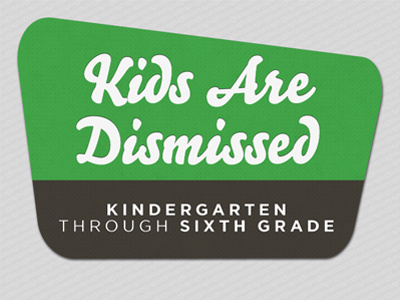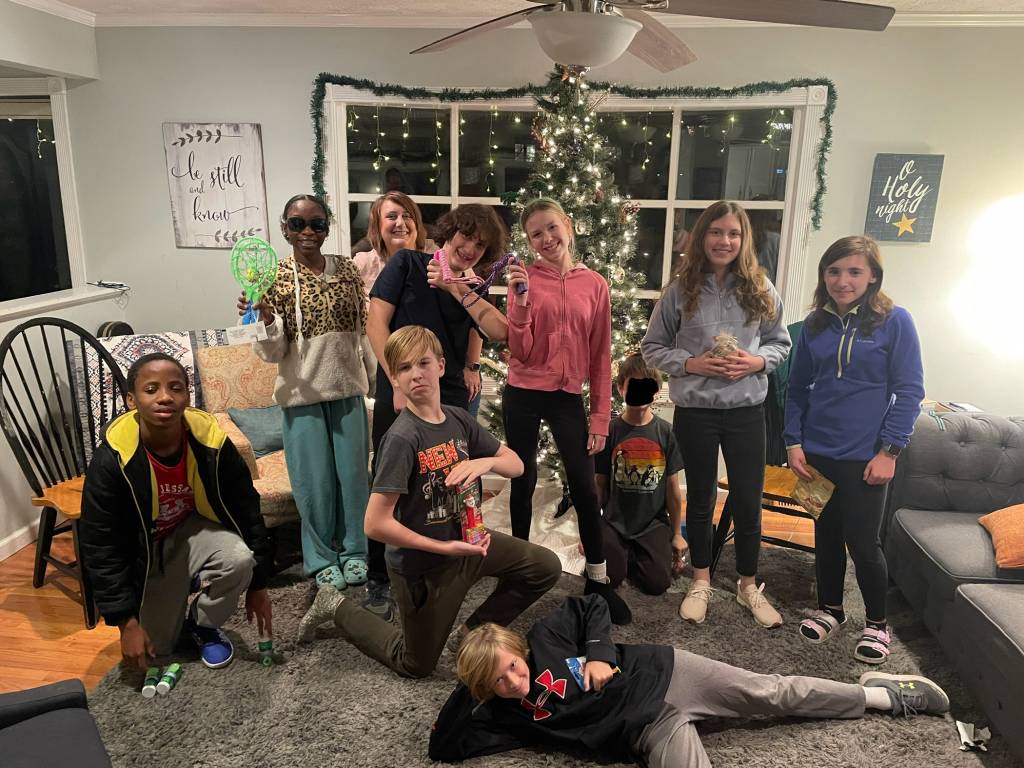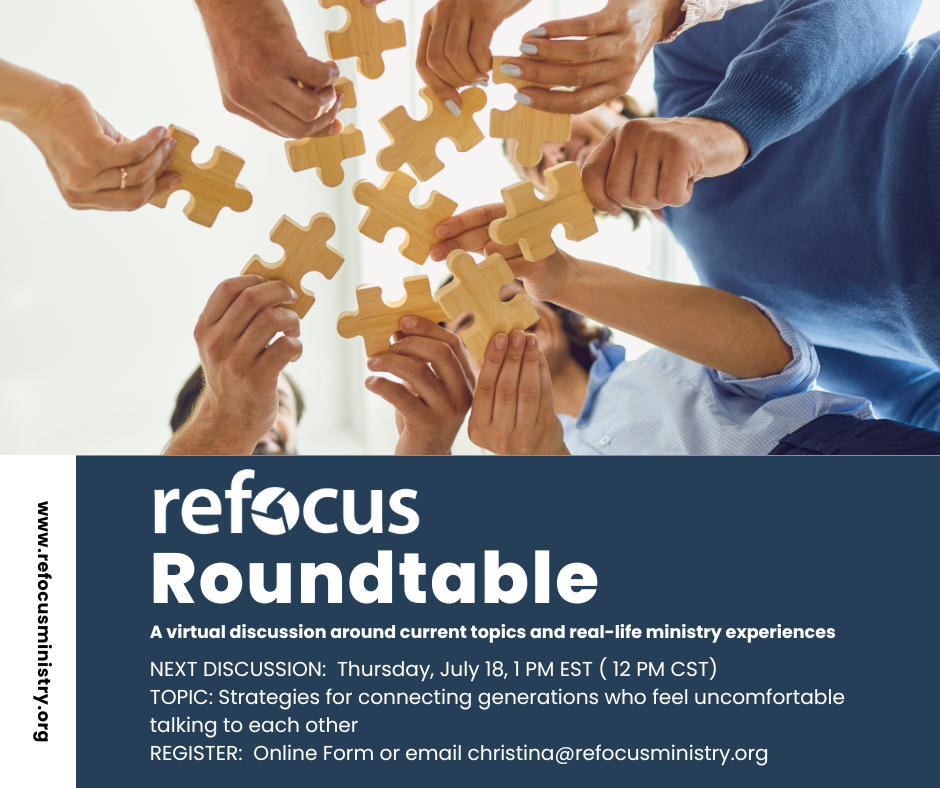How many of you have heard the following words (or something similar) spoken weekly during the Sunday morning service? “The children are dismissed and may leave for children’s programming now.”

Like many of us, I never really paid a lot of attention to that announcement nestled in the middle of a bunch of announcements or before the sermon or prayer time. It became rote and repetitive and easily tuned out. It was just the signal that it was time to move my kids from the pew to the aisle and out the door and down the stairs to the children’s area.
That was until a few months ago as I was reflecting on this practice and the power of words. My children are older now and no longer leave the service but I can clearly remember the signal and the words. Spoken weekly, the children heard the words “dismiss” and “leave” attached as descriptors to them in regards to the communal gathering for worship.
I’ve had people tell me that perhaps I am taking this too far, but there is power in our words and in repetition. So, what does happen when we hear the same thing repeated over and over gain?
- We become desensitized – We begin to basically tune it out and no longer process it. It can be detrimental to our ability to think and understand effectively.
- We begin to automate – In other words, our actions become automatic. The words become a trigger to an action without thought, like getting up and leaving the sanctuary or, as this article states, “we rely on established mental scripts and schemas to understand the information without actively engaging with it.”
- We lose meaning – When we hear the same thing over and over again, our brains tend to fill in the gaps and make assumptions about the information. This can lead to a distorted perception of the message and a decreased understanding of its true meaning (Source)
So, imagine with me that you are a child, attending a church, and every Sunday, like clockwork, you hear the words “dismiss” and “leave” and you stand up and walk out of the gathering. What does that do to a child’s brain? Do these words become integrated as part of their regular church attendance? Is there something automatic that is cemented in their forming mind that says, “You don’t belong here for this service. Get up and leave.”?
Am I reading too much into this? Maybe, but a critical look at the language we use might be a useful experience across a wide variety of platforms when it comes to our communal gatherings as a church.
Maybe simply changing our statement to say, “At this time, children are invited to join our children’s church and are always welcome to remain here as well” changing the repeated words to those of hospitality, welcome, and invitation instead of dismissal and exclusion could spark a different kind of automatic response in a child’s mind.
In 2022, our church’s youth group had dwindled in size. At one point we had about 20 kids regularly attending (a big number for us) and we had gotten to the point where sometimes we only had 3 or 4 showing up. I’ll never forget sitting in one of the smaller youth group meetings where we talked about the characteristics of God and one of the young ladies present said, “I’m so glad we have a place to come talk about this stuff. Who else can I talk to about Jesus and my faith and my friends?”
That moment stood out to me. I never forgot her words. The next year, I took on the role of Next Gen pastor and made a decision. We got rid of youth group. At least youth group as it is traditionally known and experienced in the North American context. Instead, we created a Youth & Young Adults Home Church. The core value of this gathering – to have a place to talk about Jesus, our faith, and our friendships.
A few key characteristics of Youth & Young Adult Home Church.

- It is Church – It’s not a club, it’s not a glorified Sunday school class, it’s not a program filler. It is a place where we come to worship God together and experience his presence within the community of faith.
- It is Intergenerational – Rather than limiting our gathering to one generation, we have extended the gathering to include youth from 6th grade to young adults in their 30s with two older adult shepherds to serve as guides.
- It is Spiritual Formation – We gather with three things as our “curriculum” We share a meal together, we read Scripture in community, and we take communion. Our youth volunteer to lead communion and prayer each week in our gathering. Once a quarter, we host a Service Project where we all gather in a particular area of mission and serve together.
- It is Fun – That’s right! We have fun! Each quarter we plan a Youth Hangout for our youngest members to just hangout and have fun together. These are things like movie nights and Swim Days and Mini Golf and Ice Skating and Christmas parties (see picture!). And before and after each of our Home Church gatherings, we play games, enjoy campfires, and build meaningful relationships across generations.
It may seem like an subtle shift, but changing our language from “youth group” to “Youth & Young Adult Home Church” set the stage for a formational discipleship experience that met the needs of multiple generations and fulfilled a formational void that games and parties simply cannot.
Start with the mission in mind.
Use your language to signal that mission. Instead of a “mission trip” which often times can sound more like a vacation than a place of service and worship, talk about “Joining God on Mission” and focus on partnering with places that are already working in the local community.
Instead of “worship service” which can sound like we are doing some kind of work to worship God together, consider “worship gathering” which can create a sense of community coming together with a shared desire to worship God with each other.
Instead of “intergenerational” which is a big word and can often lack clarity or be misunderstood by church members and visitors, say “all-age” or “every age and stage” to indicate inclusiveness and leave no room for confusion.
Start with the mission. Use your language to shape each experience before you even begin.
*Last Chance to Sign Up!*
ReFocus Roundtable: Connecting Generations in Discussion Together
July 18, 2024 from 1 pm to 2pm, EST (12 pm CST)
The benefits of intergenerational relationships on both young and old have been enumerated by researchers and ministers alike but in many circles, there is resistance especially from adults. Many adults express that they feel uncomfortable engaging with younger generations. Offering the reticent a few tools for positive interactions can lead to opportunities that lead to meaningful relationships and lifelong discipleship.
We invite you to join us for this interactive conversation as our shared voices will help us all to connect generations in meaningful relationships for lifelong discipleship.
It’s Time To Connect

ON SALE NOW! $99 Total (regularly $149)!
Connect Generations Coaching is a one-time intensive coaching experience that uses a research-based ministry assessment tool designed for churches to complete in less than a week.
This unique coaching experience offers specific insight into the barriers and bridges to connect generations and bring your community together. The Connect Generations Ministry Assessment Tool & Coaching Experience are available now for only $99.
About the Founder of ReFocus Ministry
Christina Embree is the founder and director of ReFocus Ministry. She holds a masters in ministry focused on Children, Youth, and Family Ministry and a doctorate in spiritual formation with a focus on age segregation and intergenerational ministry.
In addition to coaching churches of multiple denominations and traditions all around the globe, Christina serves as the Minister of Generational Discipleship for the Great Lakes Conference of the Brethren in Christ and as Next Gen pastor at Open Door Church in Lexington, Kentucky.
She is widely recognized as a speaker and author in the areas of generational discipleship, intergenerational ministry, and family ministry. As the mother of three children, she is familiar with the challenges of faith at home and pastoral ministry. She along with her husband Luke share a love for the church, their community, and the global work of peace and restoration through Jesus.
Interested in having Christina visit your church, speak at your conference, or coach your team?
Christina speaks on a wide range of topics related to children, youth, and family ministry with a unique focus on connecting generations for discipleship within your church. Her personalized approach allows you to pinpoint the needs of your community and gain the insight that you are looking for. Whether this is a volunteer team training and pastoral staff meeting or a ministerial conference, her experience and knowledge will help you determine the next step forward in creating lifelong disciples.





1 Comment
Rich Griffith
You are spot on! Despite the liquid post-modern philosophy of. “Words only have meaning we ascribe to them,” words DO matter – especially for children who are acquiring a language base and attributing meaning to words! Words that communicate, “Welcome” are certainly important, not only to children, but as you state, youth (and everyone else for that matter). I do not think there was ever a time Jesus was “unintentional” about the language and words he uses. Great work and, as a Pastor, it makes me re-think what I not only mean to communicate, but what I WANT to communicate!